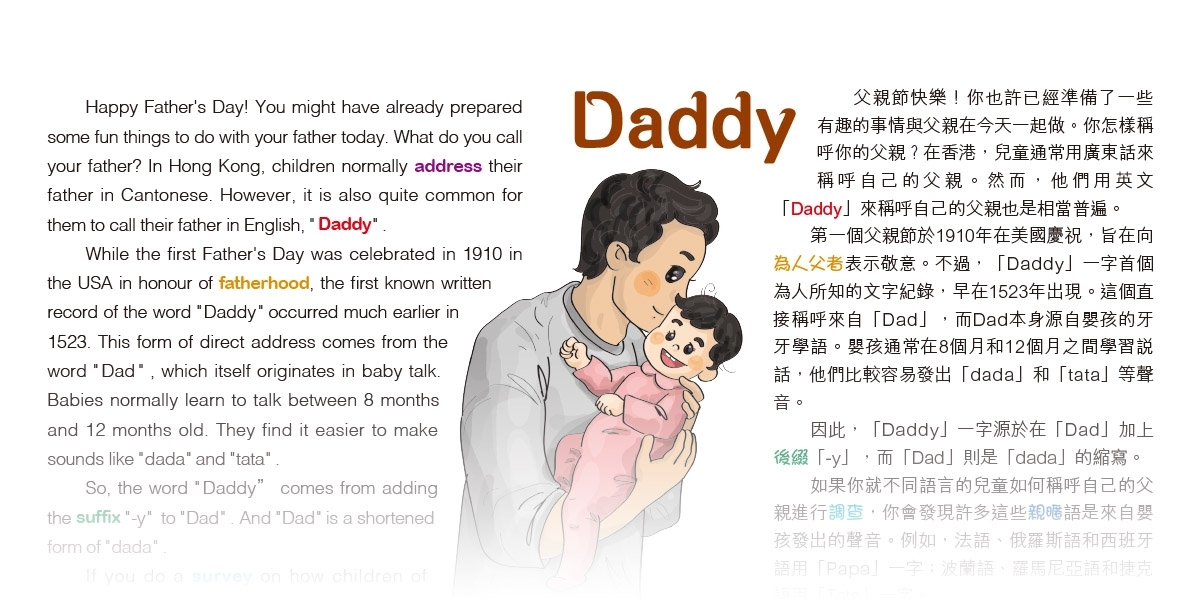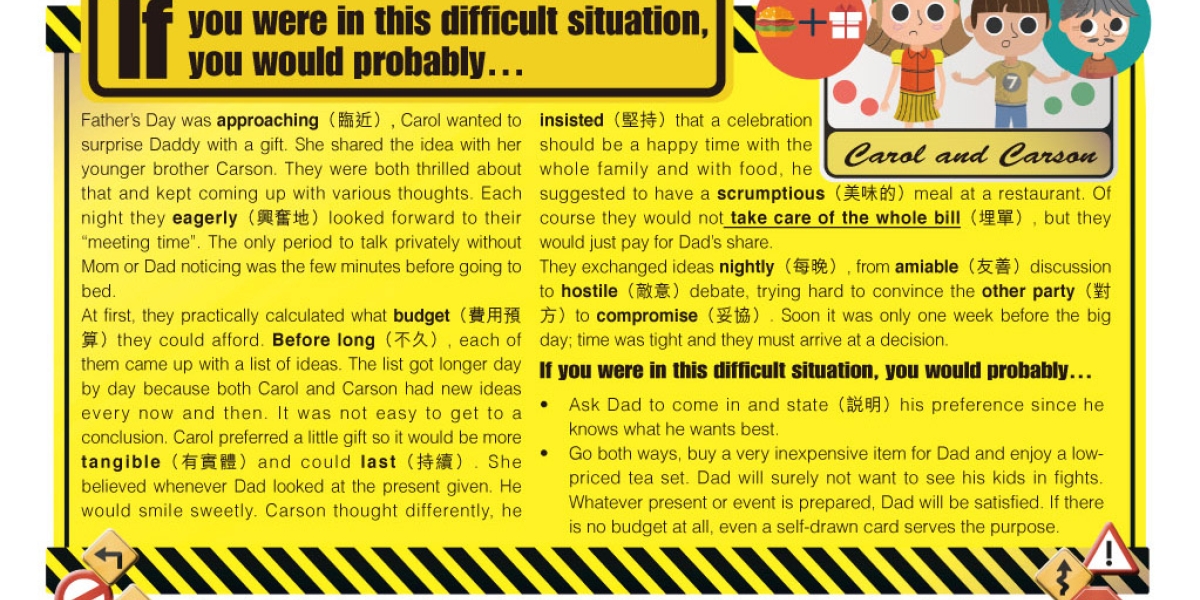昔日文章


Stories Behind Popular Sayings
2022.06.19
Daddy
Happy Father's Day! You might have already prepared some fun things to do with your father today. What do you call your father? In Hong Kong, children normally address their father in Cantonese. However, it is also quite common for them to call their father in English, " Daddy " .
While the first Father's Day was celebrated in 1910 in the USA in honour of fatherhood, the first known written record of the word " Daddy " occurred much earlier in 1523. This form of direct address comes from the word " Dad " , which itself originates in baby talk. Babies normally learn to talk between 8 months and 12 months old. They find it easier to make sounds like " dada " and " tata " .
So, the word " Daddy” comes from adding the suffix " -y " to " Dad " . And " Dad " is a shortened form of " dada " .
If you do a survey on how children of different languages address their fathers, you will find that a lot of these terms of endearment come from baby noises. For example, the word " Papa " is used in French, Russian and Spanish; the word " Tata " is used in Polish, Romanian, and Czech.
父親節快樂!你也許已經準備了一些有趣的事情與父親在今天一起做。你怎樣稱呼你的父親?在香港,兒童通常用廣東話來稱呼自己的父親。然而, 他們用英文「Daddy」來稱呼自己的父親也是相當普遍。
第一個父親節於1910年在美國慶祝,旨在向為人父者表示敬意。不過,「Daddy」一字首個為人所知的文字紀錄,早在1523年出現。這個直接稱呼來自「Dad」,而Dad本身源自嬰孩的牙牙學語。嬰孩通常在8個月和12個月之間學習說話,他們比較容易發出「dada」和「tata」等聲音。
因此,「Daddy」一字源於在「Dad」加上後綴「-y」,而「Dad」則是「dada」的縮寫。
如果你就不同語言的兒童如何稱呼自己的父親進行調查,你會發現許多這些親暱語是來自嬰孩發出的聲音。例如,法語、俄羅斯語和西班牙語用「Papa」一字;波蘭語、羅馬尼亞語和捷克語用「Tata」一字。


If you were...
2017.06.02
If you were in this difficult situation, you would probably…
Father’s Day was approaching(臨近), Carol wanted to surprise Daddy with a gift. She shared the idea with her younger brother Carson. They were both thrilled about that and kept coming up with various thoughts. Each night they eagerly(興奮地)looked forward to their “meeting time”. The only period to talk privately without Mom or Dad noticing was the few minutes before going to bed.
At first, they practically calculated what budget(費用預算)they could afford. Before long(不久), each of them came up with a list of ideas. The list got longer day by day because both Carol and Carson had new ideas every now and then. It was not easy to get to a conclusion. Carol preferred a little gift so it would be more tangible(有實體)and could last(持續). She believed whenever Dad looked at the present given. He would smile sweetly. Carson thought differently, he insisted(堅持)that a celebration should be a happy time with the whole family and with food, he suggested to have a scrumptious(美味的)meal at a restaurant. Of course they would not take care of the whole bill(埋單), but they would just pay for Dad’s share.
They exchanged ideas nightly(每晚), from amiable(友善)discussion to hostile(敵意)debate, trying hard to convince the other party(對方)to compromise(妥協). Soon it was only one week before the big day; time was tight and they must arrive at a decision.
If you were in this difficult situation, you would probably…
Ask Dad to come in and state(說明)his preference since he knows what he wants best.
Go both ways, buy a very inexpensive item for Dad and enjoy a low-priced tea set. Dad will surely not want to see his kids in fights. Whatever present or event is prepared, Dad will be satisfied. If there is no budget at all, even a self-drawn card serves the purpose.


With Love, we can do it
2012.01.08
New Year's Resolutions
Happy New Year! On the last day at nursery last year, our little boy brought home some New Year handicraft. On the picture below this article, you can see his photo, a 2012 calendar, his handprint with five little snowmen, one on top of each finger, and a short poem which reads as follows:
There aren’t just 5 little snowmen as anyone can see,
I made them with my hands which is a part of me.
So when I’m grown and older, you will look back and recall,
the Christmas of 2011, when my hand was just this small!!!
Isn’t this a lovely poem? If you ask our little boy what he wants most, he will tell you that he wants to be as big as Daddy.
Every one of us wants to start afresh and make new goals in our life. That is why we begin each year by making resolutions. Have you made yours yet? Before we decide on how we want 2012 to be different from 2011, let’s reflect on our strengths and weaknesses in academic performance, personality development and physical health in the past year first. Then set some specific and attainable goals for 2012 that you want to achieve. For example, I resolve to read a story book each month; I resolve to be nice to other kids; I resolve to limit computer games.
A study has shown that we can keep our resolutions if we break our goal into smaller steps and reward ourselves when we achieve one of these. Some other successful techniques include telling our family and friends about our goals and keeping a diary of our progress. Let’s hope that we can stick to our resolutions throughout the whole year.
Glossary:
New Year's Resolutions: 新年新決心
Strengths: 長處
Weaknesses: 弱點
Academic performance: 學業成績
Personality development: 人格發展






